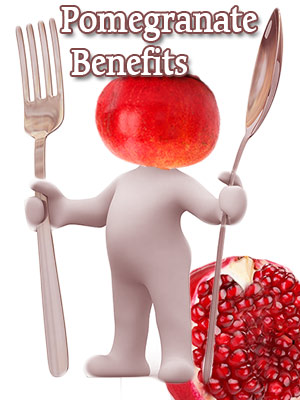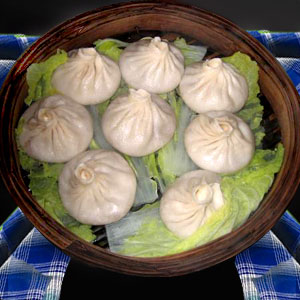Medicinal Benefits of Pomegranate

Pomegranates belong to the Punicaceae family and are characterized by their bright fuchsia-color seeds. The name pomegranate might have originated from the French term 'pomme garnete' meaning seeded apple. These fruits were originally native to Iran and India. The winter months see plenty of pomegranates sold all over. Look for deep-red colored pomegranates that are dense for their size. You can keep the seeds (arils) refrigerated for a few weeks. Juice them at home for a glassful of health.
These bright colored juicy arils contain an impressive list of antioxidants and, rich vitamins and minerals that are essential to good health. You will be amazed at the medicinal benefits of pomegranates.
Health benefits of pomegranates
Pomegranates are excellent source of antioxidants. Pomegranates score over green tea and red wine in antioxidants. Normally there are three types of antioxidants found in fresh fruits namely, tannins, anthocyanins, and ellagic acid and pomegranates are rich in all the three antioxidants. Apart from antioxidants, pomegranates also contain antibacterial and antiviral properties. Pomegranates are rich in Vitamin C (nearly 40% of daily requirements), Vitamins A and E, potassium, iron and folic acid. Pomegranates are weight watchers delight as they are very low in saturated fat, cholesterol and sodium.
They contain high amount of fibre. Pomegranate juice may interact with some prescription medications, including statins. The rind of the pomegranates is dried and used traditionally for patients suffering diarrhea and intestinal parasites. A study conducted by Queen Margaret University in Edinburgh noticed that pomegranate consumption caused a surge in testosterone; thereby improving libido. It also resulted in sharper memory and positive emotions.
Pomegranates and heart health
Recent studies show that pomegranate fruit due its high antioxidant content can prevent as well as treat heart diseases. Pomegranate juice may actually prevent the build up of plaque in the arteries. It improves the blood flow to the heart and is also known to control LDL (bad cholesterol) and improve HDL (good cholesterol) with its anti-atherogenic effect. Pomegranate juice is not only beneficial to those suffering ischemic coronary heart disease but even those who are looking to prevent it. Pomegranates contain punicalagins that aid heart health by lowering blood pressure and cholesterol and also reducing atherosclerosis.
Pomegranate helps the circulatory system function efficiently. Improved blood flow to all the organs of the body including eyes is noticed. The antioxidants in the fruit also protect the nervous system from degeneration and it especially guards us against Alzheimer's disease. The role of pomegranates is also being examined in cancer treatment and prevention and results have been very encouraging. Pomegranates contain high levels of Flavonoids antioxidants which can neutralize cancer-causing free radicals.
Research shows that the pomegranate juice can fight breast, skin, and prostate cancer causing cells effectively. The photochemical compounds present in the pomegranate fruit have the ability to protect cartilage degradation and also aid bone mass. Pomegranates aid diabetic patients considerably. When consumed after a meal, it checks the breakdown of sucrose and thus prevents sugar absorption in the body. This process keeps the 'post meal sugar levels' at manageable levels.
The nutrients found in pomegranate juice are extremely beneficial to pregnant women. According to research pomegranate juice lowers the risk of injury to the placenta. The polyphenols antioxidant in pomegranate juice also helps in preventing brain damage that can be caused by lack of oxygen during birth.
Cooking with pomegranates
Pomegranates are highly versatile and they can be used in interesting ways. You can throw in a fistful of pomegranate seeds over your salad or add it to your salad dressing vinaigrette. You can up the health quotient as well as visual appeal. Use these bright seeds in dips and sauces. The sauce can be used for grilling. Make interesting cocktails with pomegranate juice. Add pomegranate juice to your vodka cocktails. Sprinkle brilliantly-hued pomegranate seeds on your chocolate meringues.
Pomegranates for skin care
Health and culinary benefits aside, pomegranates are good for your skin too. The nutrients in pomegranates keep the fibroblasts cells alive for a longer duration, a component essential for producing collagen and elastin. This process improves the elasticity of the skin and keeps the skin youthful and radiant.
Enjoy the anti-aging and anti-wrinkle benefits from the antioxidants that abound in pomegranates. Pomegranate juice can even be applied topically on the skin. It is very effective in treating acne and healing damaged skin. It also has the ability to close open pores and keep the skin smooth and supple.
Top of the Page: Medicinal Benefits of Pomegranate
Tags:#pomegranate benefits #medicinal benefits of pomegranates #pomegranate juice
 Food and Nutrition Facts
Food and Nutrition Facts Chamomile
Parsnip Soup
Dim Sum
Gazpacho Soup
Whole Grain Cereal
Jicama Nutrition
Bok Choy Stir Fry
Chia Seeds Benefits
Teff Nutrition
Kaniwa
Flax Seed
Wheatgrass Benefits
Kelp Benefits
Types of Chili Peppers
Medicinal Benefits of Pomegranate
Arugula Leaves
Maca Root
Pitaya Fruit
Benefits of Celery
Leek
Asparagus Benefits
Oyster Stew
Oyster Mushroom
Lupin Beans
Quinoa
Freekeh
Extra Virgin Olive Oil
Dill Pickle
Sauerkraut
Fat Burning Foods
Nutrition Chart
Food Combining
Calorie Counter
calories ...
Non Alcoholic Beverage
Punch Recipes
Food Label Nutrition
Homemade Sausages
Cooking Steak
Eating on a Budget
Budget Friendly Recipes
Quick Recipes
 Healthy Packed Lunch
Healthy Packed Lunch Overnight Oats Recipes
Eggplant Casserole
Brunch Recipes
Burrito Recipes
Muffin Recipes
Cupcake Frosting
Apple Crisp
Stir Fry Cooking
Seafood Salad Recipe
Cooking Corn on the Cob
Finger Food Recipe
Sandwich Recipe
Bread Stuffing Recipes
Easy Chili Recipes
Picnic Recipes
Edible Mushroom Recipes
Mushroom Soup Recipes
Dip Recipe
Tapas Recipe
Corned Beef Recipe
Canned Salmon Recipe
Tilapia Recipes
Crumb Cake
Flourless Chocolate Cake
Regional Food
 Lasagna Recipe
Lasagna Recipe Peruvian Ceviche
Chinese Food Recipe
Vietnamese Food Recipe
Malaysian Food
Korean Food Recipe
Indian Curry Recipe
Edible Rice Paper
Mexican Food Recipe
Quesadilla
Guacamole Dip
Italian Food Recipe
Spanish Food Recipe
Kosher Food
Falafel Recipe
Tandoori Chicken
Noodles
Canape
Couscous
Meatloaf
Chowder
Gumbo Recipe
Crockpot Recipes
Moroccan Food
Healthy Food
Pre Workout Snack
Matcha Tea
Simple food Swaps to Lose Weight
Foods to Beat Stress
Foods to beat Insomnia
Bone Density Foods
Prebiotic Foods
Kefir Grains
Agave Nectar
Spicy Trail Mix
Pesto Sauce
Homemade Hummus
Crab Cake Sauce
Bamboo Shoots Nutrition
Lemon Grass Plant
Butter Beans Recipes
Loose Green Tea
Seaweed Nutrition
Healthy Food
Low Fat Granola Bar
Steel Cut Oatmeal
Fruit Pizza
Pizza Toppings
Green Smoothie
Healthy Meal Planning
Delicious Mealtime Recipes
Heart Healthy Fats
Healthy Heart Recipe
Healthy Dinner Recipe
Healthy Dessert Recipe
Healthy Fast Food
Healthy Kid Recipe
Probiotic Food
Diabetic Friendly Foods
Fruit Salad Recipe
Bread Pudding
Tofu Recipe
Oat Bran
Broccoli Salad
Avocado Recipe
Iron Rich Food
Brain Foods
Antioxidant Food
Natural Diuretic
Low Fat Cooking Tips
Rice Pilaf Recipe
Low fat Chicken Recipe
Food Tips

Sous Vide Cooking Technique
Natural Sugar Substitute
Stevia Sugar Substitute
Sunflower Seeds Nutrition
Bouquet Garni
Cake Decorating Tips
High Satiety Foods
Thanksgiving Dinner
Safe Food Storage
Frozen Food Storage Tips
Cold Storage Food Tips
Leftover Recipe
Food Pyramid
Dairy Free Food
Microwave Cooking
Food Intolerance
Homemade Ice Cream
Apple Cider Vinegar
Benefits of Honey
Beverage Cooler
Food Poisoning Symptom
Food Allergy Symptom
Food Addiction
Top of the Page: Medicinal Benefits of Pomegranate
Popularity Index: 101,341

